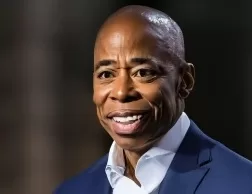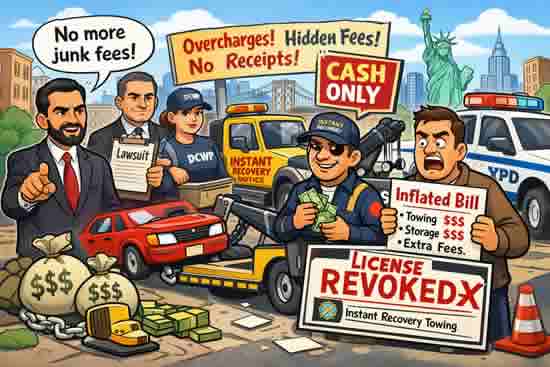Mayor Adams and OLR Commissioner Campion announced a tentative contract agreement with the United Probation Officers Association for over 600 municipal employees. The agreement, retroactive from November 28, 2022, and extending to June 12, 2026, includes significant wage increases and a new 11-year step pay plan aimed at addressing recruitment and retention challenges. The contract, which follows the DC 37 pattern, is expected to improve the Probation Department’s ability to attract and retain staff while ensuring fair compensation for their crucial role in public safety.
Mayor Adams, OLR Commissioner Campion Announce Tentative Contract Agreement With United Probation Officers Association For Over 600 Municipal Employees
Lisa Zornberg, Chief Counsel to the Mayor and City Hall: Good afternoon, and thank you everybody for joining for this important announcement. My name is Lisa Zornberg, I’m chief counsel to the mayor. Before we begin, I would like to introduce the individuals who have joined us here today. Standing beside me is New York City Mayor Eric Adams, we have Deputy Mayor for Public Safety Philip Banks III, First Deputy Commissioner of the New York City Department of Probation Sekou Ma’at, we have First Deputy Commissioner for the Office of Labor Relations Daniel Pollak, and we have the President of the United Probation Officers Association of New York City Dalvanie Powell.
Our administration is laser-focused on protecting public safety, rebuilding our economy, and creating a more affordable and livable city for working class New Yorkers. The New York City Department of Probation plays a critical role in helping to achieve those goals. In addition to enforcement, the Probation Department provides treatment and support to help justice involved individuals forge new pathways to move out and stay out of the justice system. And it is now my pleasure to turn this over to Mayor Eric Adams.
Mayor Eric Adams: Thank you. Thanks so much Lisa, and really I want to thank the men and women of the Department of Probation. Something that Deputy Mayor Banks and I talked about over and over again, the services they provide is often overlooked, and how proactive they are, how we see those who are justice involved, how they do not return back to the system. And as the chief counsel stated, this is really laser-focused on public safety, as I state over and over again, is a prerequisite to our prosperity.
And so today, along with the team of the Office of Labor Relations, I am proud to announce that we have secured a new contract for our probation officers. That means long overdue wage increases for these dedicated public servants, that simultaneously ensures a fair deal. This contract shows a fair deal for taxpayers, as well as these men and women that provide a vital public safety role in our city.
Probation officers work tirelessly to keep our city safe by helping justice-involved people get back and stay on the right path. They have our backs, and I was clear when I was elected to office, I would have the backs of the men and women of our city employee staff. This is a tentative agreement that shows we have the full focus of making sure they receive the salaries that they can provide for their families in this city. The wage increases will help us recruit and retain a strong workforce. Just as importantly, they demonstrate our commitment to fairness. If you dedicate your life to serving New Yorkers, our administration believes you should be paid fairly.
So our tentative agreement is retroactive, beginning on November 28, 2022, and it’s expiring on June 12, 2026. It matches the pattern laid out in our agreements with DC 37, UFT, and dozens of other unions. Our agreement also creates an 11-year step pay plan for probation officers and supervisors, improving the current salary ranges and starting salaries. And I consider myself to be a blue-collar mayor, and we need to look after blue-collar workers in this city and give them the pay they deserve. That’s why in the last 18 months, we’ve settled 97 percent of our city workforce. That’s hundreds of thousands of New Yorkers that are neighbors, our friends, our colleagues and families earning the wages they deserve for keeping our city going every day.
We’re creating a fairer and more equitable city for all, and we’re delivering on our vision and our promise for a more affordable and living city. And we’re going to ensure that New York City is not only the greatest city in the world to live, but also the greatest city to work. Congratulations. We’re really pleased with this contract. This is something we wanted to get done. And madam president, I thank you for your hard negotiation powers. Thank you very much.
Zornberg: Thank you, Mayor. I’d now like to call to the podium the deputy mayor for Public Safety, Phil Banks.
Deputy Mayor Philip Banks III, Public Safety: Thank you, Lisa. Thank you, Mr. Mayor. Good afternoon, everyone. Public safety is a team effort, and you know, before he was Mayor Adams, Eric Adams has been stressing this over and over again. And you have seen it in how we are working on the cannabis problem. You’re seeing it how we’re working on a drug vehicle problem. You’re going to see it real soon on a ghost car operation you’re certainly going to do with our public safety school.
The mayor always says, there’s one patch. It’s the City of New York, and you’re paid by one person, and that is the residents. So this is a team collaboration effort. And I think that we are going to see the ramifications of this. So why is it important when it comes to this contract? Because every member of the team has to remain strong. They got to continue to doing the job to keep our city safe. And what makes a team stronger is investing in the people that they do work. And I’ve been dealing with the probation union president for many, many times. And I tell you, there has never been as fiercer an advocate for her members, take it from me, as her and all the calls that she has done. And I would say that, mayor, I don’t enjoy a lot of your phone calls, but if I was a probation officer, I certainly would vote for you.
And we hope this new contract, it just strengthens that particular process here. Every day, probation officers are on the ground, hoping people stay out of the criminal justice system. I know it sounds real sexy, and the bad guy, the bad girl commits a crime, and they get caught. But when they don’t commit the crime, that’s not the story. But when they’re not committing a crime, it’s because the members of Probation. They come in there, broken or altered, and they fix them. They do a fantastic job. And you know, to your members here, you’re never, ever, ever going to get the full, full credit. But the job that you do and the contribution that you do to keeping this city safe is astonishing, and I just cannot, cannot say that anymore.
Your law enforcement, your social workers, your mothers, your fathers, and when you deal with those probation officers, they say, you give them a comfort that they can, in fact, have a crack at it. So I just really wanted to… I know reiterating that particular point, Probation, you’re the unsung heroes of the criminal justice system, and you do a fantastic job, and they work hand-in-hand, and they will continue to work hand-in-hand with all of our public safety apparatus.
So this agreement, it helps us retain and attract the best talent in public safety. I need the best to say, I want to be a probation officer, because I have no doubt when we get them there, and we give them an affordable salary that they take care of themselves and take care of their families, the gratification that they have once they’re in there is paramount. So I owe a great deal of gratitude to our probation officers, and I’m not just saying it to you now, I say it to them all the time, because I deal with them, but I just want to say it publicly, I think you are a really, really fierce, fierce advocate for your members, and Dalvanie Powell has always said, you’re butchering my name, but I will say this, I won’t butcher this, I think that you have done a great job bringing this particular contract together, you working with the mayor. And of course, Renee is not here, but that battle going back and forth, and I hope that the ramifications that we’re expecting from it, the benefits as well.
So our administration is committed to supporting all the public safety personnel, and what they deserve, and I’d like to just say to you and your members, very much proud of you and your future contributions, and thank you very much.
Zornberg: Thank you, deputy mayor, for those remarks, and it’s now my honor to introduce the President of the United Probation Officers Association of New York City, Dalvanie Powell.
Dalvanie Powell, President, United Probation Officers Association of New York City: Thank you, everyone. Thank you, mayor, thank you, Deputy Mayor Banks, I want to first thank, again, the Mayor Adams, and Commissioner Renee Campion, that we were able to reach a tentative collective bargaining agreement that reflects the following. We have substantially begun to resolve the recruitment and retention issues, and that anyone hired on or after this November will receive a new negotiated salary that will resolve the recruitment issue, and we were able to also negotiate a step plan that we’ve never had before that will substantially resolve the retention problem.
We look forward to meeting with the representatives of the City of New York and the Department of Probation to discuss ways to become more efficient with flexibility in work schedules, which in part includes working remotely and modifying hours of work. I want to again thank Mayor Adams and Commissioner Renee Campion for working together and recognizing our needs. And also before I close, my initial intention was to become an attorney, and I graduated from John Jay, and I stopped by Probation temporarily, and 37 years later, I’m still here, and I feel like there was a higher power that had a better intention for me to advocate, not just for my mayors, but for the citizens of New York, and I want to thank you again.
Zornberg: Okay. Thank you so much, president. We have one speaker left, and that is going to be First Deputy Commissioner for the Office of Labor Relations, Dan Pollock, but before Dan, you can come closer. I just have to say, since I came to City Hall a year ago, I’ve been so delighted to have the Office of Labor Relations in my portfolio. It is just a sensational agency with incredible leadership, so much so that the mayor has changed Commissioner Renee Campion’s name to Renee Champion, but no one does it by themselves. Representing the city, getting things done is all about effective teamwork, and the first deputy commissioner, Dan Pollock, is just as sensational, so it’s really my pleasure to call him up to the mic.
First Deputy Commissioner Daniel Pollak, Office of Labor Relations: Thank you, Lisa, for those kind words. Commissioner Campion and I first want to thank the mayor for his leadership and continued support of our office. I also want to thank Chief Counsel Lisa Zornberg and Deputy Mayor Banks for their support during this negotiation, as well as Probation Commissioner Holmes, and thank you to Dalvanie Powell, the UPOA president, who worked hard to deliver the best possible contract for her members, along with her attorney, Harry Greenberg, and the rest of her team.
Thank you to the team at OLR and OMB, who worked along with me and Commissioner Campion to deliver this agreement, this tentative agreement. [Matt Campisi,] our associate commissioner, who has put together so many of these deals over many years of service for the city, Karey Leung, our director of research, and [Carrie Gow] and [Elizabeth Beroy] from the OMB labor team, along with, of course, the budget director, Jacques Jiha, and the first deputy director, Ken Godiner.
So now I’m going to go into some of the details of this tentative agreement, which is subject to union ratification. The term of the agreement is November 28th, 2020, through June 12th, 2026, so about five and a half years. It contains general wage increases following the DC 37 pattern of 3 percent, 3 percent, 3 percent, 3 percent, and 3.25 percent, retroactive to May 28th, 2021, which is the date of the first wage increase. It also contains ratification bonuses of $3,600 for probation officer trainees, $4,355 for probation officers, and $5,080 for supervising probation officers.
Finally, effective November 28th of this year, as some of the earlier speakers had mentioned, it establishes an 11-year step pay plan for probation officers and supervising probation officers, which would replace the current salary ranges. Probation officers will start at a salary of $61,386 and move up in salary each year, reaching a top salary of $81,000 after 10 years of service. Supervising probation officers will start at $86,500, reaching top pay of $95,100 after 10 years in that title. And any employees who earn above these pay rates with the pattern wage increases that I mentioned will, of course, be kept whole and maintain those higher wages.
The total cost of the agreement is approximately $52 million through Fiscal Year 2028, and it’s fully funded in the financial plan. With this agreement, we have now settled contracts with approximately 97 percent of the city’s workforce, hundreds of thousands of employees, and we are proud to have worked with the UPOA to deliver an agreement that provides valuable wage increases to these public servants and is fair to city taxpayers. Thank you.
Question: I guess this question is for Ms. Powell, if any of the members want to answer, I know there was a 45 percent staff reduction [inaudible] a little bit about what that staff reduction looks like [inaudible] any of your members and then you talked about obviously the salary increase would help not just with retention but with recruitment but if there’s anything else that you’re doing to hello recruit more officers.
Powell: The staff reduction looks really bad. It’s really bad right now. And our hopes is that with this contract, we’ll be able to attract more people to come and stay. It’s so bad that they can’t even stay in the academy class. So hopefully this will be a boost and help us alleviate some of the pressure that the remaining offices are dealing with now having to carry those extra caseloads. So we’re hoping that this will be much better for the city as a whole. Is that correct?
Audience: Correct.
Powell: Correct. That’s the crew. They know.
Question: [Inaudible.]
Powell: Going in the wrong direction. For sure. For sure. I mean, we have some… Our commissioner has some really good ideas and initiatives in the direction she wants to take the agency, but it’s kind of challenging. Not that we’re not doing it, we’re doing it, but it’s challenging. It’ll be a lot easier if we can eliminate, you know, reduce the caseloads to give much more love that we need to give to the cases.
Mayor Adams: And before you do the second question, DM Banks has really brought this to our attention. He has done analysis of all of our criminal justice apparatus and we’ve stated over and over again that across the entire country, we have been impacted in law enforcement. We’re losing… Many district attorneys don’t want to continue to be in that role. We’re losing correction officers. We’re at code red for the Department of Correction. Police officers are not signing up at the magnitude that they were doing previously, and the Department of Probation.
And so this is a real, this is a national problem that we need to look at. There needs to be a real infusion of resources across this country to recruit, retain law enforcement, criminal justice throughout this entire country. And we have to look at some of our laws like the discovery law and how that’s impacting of our district attorneys. And so this is a real issue, the retention of criminal justice personnel, which is the foundation of our public safety. And so we’re seeing it in every one of our agencies, you’re seeing this impact. Okay, so listen, I want to…
No, listen, we want to deal with the issuing of an inquiry into City Hall. And I’ve made it clear over and over again, you know, I’m a former law enforcement person. We’re going to follow the rules. We know the rules. I follow the rules and I’m going to continue to do so. And whatever information we can give to show that we have complied with the rules, we’re going to do that.
This is all part of the process. We’re going to follow that process and come out on the other side showing that not only as a law enforcement officer, as a borough president, but as a mayor, I comply with the rules of the city and the state of New York and our federal rules. And it just would be irresponsible for me to go into this inquiry and I’m not going to do that. But our chief counsel is here, Counsel Lisa Zonenberg, and any other questions you have, she’ll be more than willing to answer.
Question: We spoke with a former federal prosecutor who’s currently a white collar defense attorney who said if they found absolutely nothing from the first round of taking the devices and essentially the first round of subpoenas nine months ago, absolutely nothing, there would be no reason for the second round of subpoenas which just occurred in July. I’m just wondering if you could respond to that from a strategic standpoint. Why would there be new subpoenas if there was nothing?
Zornberg: I think there are different… I can’t comment on strategy of the Southern District of New York. All I can say is that from the moment this investigation started, we’ve said that we’re cooperative here at the Mayor’s Office and we are. And we have been subpoenaed by SDNY and will fully comply and have been.
Question: Can you just clarify what the subpoenas are for? Is this for text messages or evidence or what exactly is it?
Zornberg: So, thank you for the question. When SDNY serves a subpoena, including in this case, their cover letter expressly requests that the recipient refrain from even acknowledging the existence of the subpoena. So, that’s standard practice and because we’re so cooperative, we’ve complied with that.
The only reason I’m even acknowledging today that the Mayor’s Office has been subpoenaed by SDNY is because public reporting attributing to law enforcement sources is saying a subpoena or subpoenas were sent. So, that’s the only reason I’m even acknowledging it. We’ve been very respectful of SDNY’s process and will respond as required.
Question: Hi, Mr. Mayor. I know I asked you earlier about the DNC. You said you’re still planning to attend. I wonder, with these new rounds of subpoenas, does it concern you in your meetings with national leaders that that’s going to affect your conversations with them? That’s going to cloud whether you speak on migrants or public safety to those national leaders?
Mayor Adams: No.
Question: Sir, this has gone on for a long time, as you know. Would you like them just to say something?
Mayor Adams: Listen, it takes a great deal of discipline to defend yourself when you know you have done nothing wrong. But I trust my team. I have an offensive line that’s going to allow me to move the ball down the field and to fight on behalf of New Yorkers on some of these real issues that we’re facing in the city. I have a great deal of trust in my team. I am going to go by the rule, comply, be as transparent as possible, and follow the rules. And that’s what we’re doing.
Question: [Inaudible] impact the campaign?
Mayor Adams: No. Listen, I’m not going to be here the whole day. We’re going to take a few more. But I want to be very clear. I’m not going to be here the whole day. I’ve got a whole city to run. And no matter what we say, you’re going to write the story the way you want it. So we’ll take a few more questions, and then I’ve got to bounce. I’ll take three more questions.
Question: Mr. Mayor, how are you? You and your administration have said that you proactively responded to this and provided evidence…
Mayor Adams: I’m sorry?
Question: You and your administration proactively provided evidence, text messages, what have you. So why would subpoenas be needed at this point? And also with the subpoenas, you know, we’ve been told from our law enforcement sources that it’s text messages, communication, what have you. I know you’re saying you can’t confirm. But, Mr. Mayor, would you be willing to say if you were asked to sit down and testify before the grand jury as a witness?
Zornberg: I’m just going to step in here. First of all, there was, I think, a mistake in how you posed the question. You said about productions by the administration. I just want to be clear that if you have questions about the mayor or the mayor’s campaign, those questions should be directed to Wilmer Hale.
Question: [Inaudible] said too, that your administration, that you’ve handed over this, because City Hall has also been issued a subpoena…
Zornberg: So why would a subpoena be necessary, is your question? You know, that’s a question for SDNY. What I can tell you as a former 16-year veteran of that office is that subpoenas are an incredibly common tool for gathering evidence and documents. They are frequently issued. Even where parties are giving documents voluntarily, that is entirely common.
Question: Obviously, you’re not giving a whole lot of detail here, but do you fear, mayor, that this could get in the way of your ability to do the job or at least your image publicly?
Mayor Adams: When this first happened, that question was asked. And since that day, we continue to build more affordable housing in one year in the history of the city. We continue to drive down crime. We continue to break records in small businesses being opened. We continue to show that my ability not to be distracted, stay focused, and grind. That’s a skill that I have.
And as I navigate us out of this asylum seeker crisis and many other things that’s taking place, when you ask me that question, I think nine, ten months ago, and I continue to show my ability to trust my team, move the ball down the field, and fight on behalf of working-class New Yorkers in this great city. And I’m going to continue to do that.
Zornberg: Including probation officers.
Mayor Adams: Including settling on the contract of probation officers.
Question: Sure. Thank you. Has anyone been asked, not just for documents, but to testify to a grand jury, or give an interview, and if so, who?
Zornberg: What I’ll say here is that we are incredibly respectful of the review that SDNY is doing. And just like they don’t want information shared, and send out standard letters saying please don’t even confirm the existence of a subpoena. We’re not going to share those details. What I can say is I personally have no knowledge of any person testifying before a grand jury.
August 16, 2024 New York NY
Sources: Midtown Tribune news, NYC.gov
Big New York news BigNY.com














